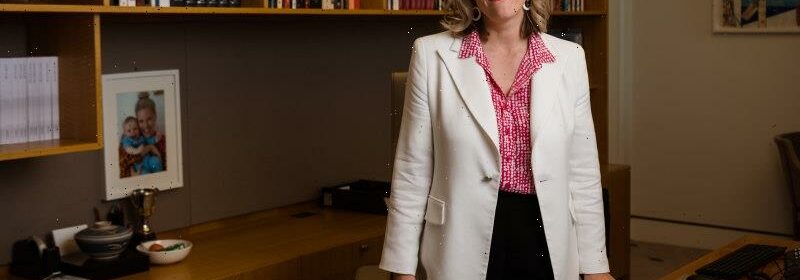‘Always been in a hurry’: New home affairs minister faces biggest test

Less than a month before the 2013 election, Clare O’Neil made a life-altering decision.
Labor’s candidate for the safe Victorian seat of Hotham, Geoff Lake, had just been disendorsed after controversial comments he made a decade prior were revealed. Then-prime minister Kevin Rudd needed another candidate quickly.
Home Affairs Minister Clare O’Neil has just embarked on the biggest overhaul of the nation’s migration program since the end of World War II.Credit:James Brickwood
It would have been understandable if O’Neil, then 32 and with an eight-week-old boy, decided not to take up the offer of being preselected for the seat. But she has never been someone who turns down an opportunity.
“I absolutely was not expecting that – I was in the complete haze of a newborn baby where you’re not sleeping and all you do is care for your newborn,” she tells The Sunday Age and The Sun-Herald.
“So it was a really difficult thing to do. But of course, my values are about trying to make a difference for the country. And so I just knew that I had to take the chance and then ended up in federal parliament three weeks later.”
History repeated itself at the 2022 election. Former NSW premier Kristina Keneally was always going to be home affairs minister if Labor won the election. But then Keneally failed to win the seat of Fowler, and Prime Minister Anthony Albanese tapped O’Neil on the shoulder to take over the massive portfolio.
O’Neil at Federation Square in 2013.Credit:Simon O’Dwyer
After announcing this week that the permanent migration cap would increase 35,000 places to its highest level, O’Neil now has the task of overseeing the biggest overhaul of Australia’s immigration program since the end of the World War II.
While O’Neil concedes she wasn’t expecting to be home affairs minister, she says she has studied immigration most of her life and it is one of the key reasons she got into politics.
“Immigration is a subject that I’ve sort of been reading and thinking about since I was really young person,” she says. “And so I feel like I definitely came into the role with a lot of pretty formed ideas about things I would want to do with it. But I wasn’t anticipating that this was going to happen.”
While Australians may be used to the home affairs minister mainly talking about stopping boats, catching terrorists and arresting paedophiles, it’s clear O’Neil has a more expansive view of the portfolio.
She describes immigration as the “forgotten child of the previous government”.
“And that’s part of the problem. That’s why we’ve ended up on this continental drift because it’s clearly screaming for reform. But no one ever picked up the project and said, ‘let’s take this on’.”
Born to prominent Australian publishers Anne O’Donovan and Lloyd O’Neil, she and her brother, Patrick, who is a journalist with The Age, were brought up with politics discussed at the dinner table.
At 22, O’Neil was elected to Dandenong council, and a year later became the youngest female mayor in Australian history.Credit:Angela Wylie
O’Neil’s parents told her that her purpose was to help serve the community and others, not just to pursue her own interests.
After joining the Labor Party at the age of 16, she attained arts and law degrees from Monash University. “I remember being genuinely shocked when I heard someone I knew didn’t vote Labor, I was just so surprised.”
At 22, she was elected to Dandenong Council, and a year later became the youngest female mayor in Australia’s history.
Back then, she says she was a little naive about how sceptical people were of politicians.
“Something I find funny about politics is as soon as you enter elected office, people immediately question your motivations in a way that is disconcerting,” she says.
“I’ve always seen politics as an act of public service and you try to do the right thing for your community and country, but I accept and fully understand now that is not how most people see politics.
“So as a 22-year-old, bright-eyed, idealistic young person, it was a little bit of a shock to me for people to assume that I must have had other motivations.”
After Labor’s devastating election loss in 2019, O’Neil publicly announced that she would run for deputy leader of the party, before pulling out to make way for fellow Victorian Richard Marles.
At the time, O’Neil said colleagues gave her respectful and honest feedback, and that it was not the right time for her to become deputy leader.
“Being a woman in the Labor Party doesn’t mean you will win every ballot,” she said three years ago.
She then set about identifying some of the reasons for the election defeat, giving a speech in late 2019 that urged the progressive movement to stop talking down to people.
She was appointed Labor’s aged care spokesperson in January last year, and successfully prosecuted the Labor opposition’s case against the Coalition government’s handling of the aged care crisis.
But being home affairs minister will be her biggest test. She is in charge of Australia’s vast apparatus of domestic security agencies, including the Australian Security Intelligence Organisation and Australian Border Force.
“I guess I have always been in a hurry in my life,” she says. “It’s the honest truth. I never wanted to wait to do things.”
Cut through the noise of federal politics with news, views and expert analysis from Jacqueline Maley. Subscribers can sign up to our weekly Inside Politics newsletter here.
Most Viewed in Politics
From our partners
Source: Read Full Article


